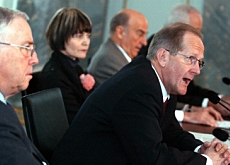Schengen vote threatens government cohesion

Comments by Christoph Blocher suggesting the cabinet is divided over plans to join the EU's Schengen/Dublin accords have sparked a fresh debate about collegiality.
Political analyst Julian Hottinger told swissinfo that the justice minister was caught between his obligation to toe the government line and the demands of his rightwing People’s Party.
Blocher broke cabinet ranks on Sunday by declaring his opposition to the Schengen/Dublin accords on fighting crime and asylum.
Under the principles of collegiality the seven cabinet ministers are expected to present a united front once they have agreed a common position.
But at a public meeting organised by the People’s Party to commemorate the end of the Second World War on Sunday, Blocher said that to claim the entire cabinet backed a crucial yes vote on June 5 in favour of Schengen/Dublin was wrong.
“I cannot understand how a government member can claim there was a unanimous vote when there wasn’t,” he said, referring to Economics Minister Joseph Deiss.
Deiss said at a news conference to launch the government’s pro-Schengen campaign that the cabinet was firmly in favour of adopting the accords.
While not criticising the justice minister directly, both Deiss and Swiss President Samuel Schmid have pointed out that the collegiality rule still stands.
A cabinet spokesman confirmed on Wednesday that the subject was discussed during the government’s weekly meeting, but declined to comment further.
swissinfo: This is not the first time that Blocher has broken the government’s unwritten collegiality principle. Should we expect this to become a regular event?
Julian Hottinger: This is a constant debate that comes up with every new government minister. When the cabinet is weak and one of the new ministers feels he or she has to establish his or her authority, he or she will most likely breach the bond of solidarity among government ministers.
So [the breaking of the collegiality principle] happens on and off. This bond is 150 years old and its been breached in the past. It happened during the Second World War, during the Cold War and since then as well. It’s not uncommon.
What was surprising was the timing of Blocher’s outburst and how he used it used to express himself ahead of the June 5 Schengen/Dublin vote.
swissinfo: Last month Blocher was officially defending the government position. Has he turned his coat ahead of a crucial vote?
J.H.: What he tried to do, and I think it didn’t work, was to say that in his official function he is obliged to toe the government line on the June 5 vote. But he hoped that by talking at a less formal function he could shift his position and say something else.
I think he also acted under pressure from his own People’s Party. There are many members who say he has changed since joining the cabinet. They feel that he is no longer defending the party’s positions within the government. So to save face he felt obliged to speak out.
swissinfo: Blocher knew what to expect when he was elected to the government in 2003. Is he trying to play the game by his own rules?
J.H.: Without a doubt he’s trying to redefine the rules. He knew perfectly well what he would be confronted with. It’s not his first political fight and it won’t be the last one. He hopes to be able to change things. What he didn’t expect to a certain extent was the resistance to changing institutions. This is probably the strongest opposition he’s been confronted with.
There is a traditional electorate that supports some of his ideas, but when it comes to changing the administration or the way the government operates people are not at ease.
swissinfo: In his speech on Sunday, he pointed the finger at some of his colleagues, in particular Economics Minister Joseph Deiss. Was this an unusual step, going beyond simply disagreeing with other members of cabinet?
J.H.: To a certain extent it is. In Switzerland, the line has usually been ‘silence means more than words’. Traditionally, if you didn’t agree with a cabinet decision, you just kept your peace. The virulence of the terms Blocher used on Sunday shows there is a change of style and a desire to provoke the other members of the government, to force them either to react or say what they think of his position. He probably hopes this will create a wider debate.
But we shouldn’t forget that he was talking at a meeting that was held to celebrate the end of the Second World War. The meeting was informal and most of the people attending were People’s Party sympathisers.
swissinfo: Why has Blocher chosen to break ranks over Schengen/Dublin? He hasn’t come out against the proposed gay partnership law even though he was opposed to it as a member of parliament.
J.H.: The People’s Party has built its political platform on opposition to Europe for more than a decade. Blocher doesn’t really have a choice. If he loses this battle, it could be one of the final ones as far as he’s concerned, if not a major defeat. So he has to focus on this issue.
He also realises that it’s better to focus on one issue than to fight on two fronts and lose twice.
swissinfo: You get the distinct feeling Blocher has been isolated from his colleagues or has isolated himself. Does he have his own agenda, or does he simply not care about government cohesion?
J.H.: On this issue, he is alone, but I’m not sure he’s alone on other issues. He knows perfectly well that in some cases he can win if he plays his cards right. But on June 5, he realises he could be in trouble when the results come out on the Schengen/Dublin vote.
swissinfo-interview: Scott Capper
Christoph Blocher was born in Schaffhausen in 1940.
He was elected by Zurich voters to the House of Representatives in 1980.
A member of the Swiss People’s Party, Blocher built his political career on opposition to Swiss membership of the European Union and illegal immigration.
His party emerged as the winner of the last national elections in 2003, strengthening claims for a second cabinet seat.
On December 10, 2003, Blocher was elected to the seven-member cabinet, replacing Christian Democrat Ruth Metzler.

In compliance with the JTI standards
More: SWI swissinfo.ch certified by the Journalism Trust Initiative



You can find an overview of ongoing debates with our journalists here. Please join us!
If you want to start a conversation about a topic raised in this article or want to report factual errors, email us at english@swissinfo.ch.